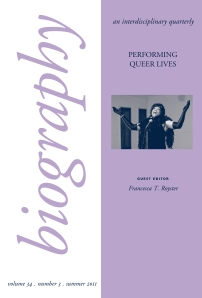EDITOR’S INTRODUCTION
Introductory Notes: Performing Queer Lives
Francesca T. Royster, v
How are life writing and queer theory at odds with what we’ve come to expect in autobiographical narratives? The essays in this collection intervene in the traditional project of autobiography by taking as their subject the process of queered meaning making. Our focus on “queer” and “performing” brings the following challenges to life writing: first, to expand the social definitions of the self or “I” as the readable, recognizable subject; second, to introduce the resistant, playful, and sometimes odd or eccentric aesthetics of “queer” into life writing’s language, form, and treatment of the social fabric; and third, to give special attention to the performative as a process of self-making and self-recognition that is active, ongoing, contingent on relationships to others, and grounded in embodiment. All written by folks of color, the essays in this cluster are also liberation narratives, centrally concerned with freedom and social change larger than but including ourselves. Using queer theory, performative writing, memoir, and interview, these essays explore queer ways of knowing, while suggesting how queer bodies can teach the world by naming the unnamable, courting the illusive, and training us to see and feel differently.
ARTICLES
Queer Epistemologies: Theorizing the Self from a Writerly Place Called Home
E. Patrick Johnson, 429
Drawing on the insights of performance studies, this essay theorizes writing as autobiographical performance. Methodologically, the essay employs the act of writing itself to engage the politics of representation and the ways that class, race, sexuality, and gender may be meaningfully explored through the self-reflexive act of performative writing.
Becoming Joaquin and Mind If I Call You Sir?: Exploring Latino Masculinities
Lourdes Torres, 447
Becoming Joaquin and Mind If I Call You Sir? are autobiographical transgender narratives that offer insider perspectives on transgender realities. These two texts productively complicate our understanding of contemporary non-normative female Latino masculinities. While one text is fictional and the other features autobiographical histories, both rely on the trope of life story telling to address non-normative Latino masculinities in contemporary culture.
Being and Belonging: Joey Terrill’s Performance of Politics
Richard T. Rodríguez, 467
Since the early 1970s, Los Angeles-based Chicano artist-activist Joey Terrill has been at the forefront of numerous struggles for social justice. This essay examines the performative politics of Terrill’s t-shirt art, ’zines, painting, and testimonio, while situating his biography within a community of Latino gay male artists impacted by AIDS.
Fela!: Fela Kuti, Bill T. Jones, and the Marketing of Black Masculine Excess on Broadway
Francesca T. Royster, 492
Choreographer Bill T. Jones and Nigerian Afrobeat legend Fela Kuti have both shaped careers that have confounded categorizations, exploring sometimes contradictory spaces of gender, sexuality, race, and national loyalty through performance. This essay considers the recent Broadway show Fela!, a biographical and performative exploration of Fela Kuti and his life, directed and choreographed by Jones, as a means of thinking about the queer interconnections between these two performers.
Holding
Aimee Carrillo Rowe, 518
“Holding” is a braided lyric essay that weaves narrative, performance, and theoretical strands to pose the question: How do we hold trauma, without it holding us? This question is particularly acute for queer people of color, who often undergo or inherit legacies of imperial trauma. It is also vital for researchers, writers, and performers who excavate imperial trauma. I suggest that collective and individual sacred healing practices provide a means of recovery, allowing us to disentangle ourselves from trauma’s grasp, while remaining present to its effects.
REVIEWS
Self Impression: Life-Writing, Autobiografiction, and the Forms of Modern Literature, by Max Saunders
Reviewed by Peter Nicholls, 528
Bureau of Missing Persons: Writing the Secret Lives of Fathers, by Roger J. Porter
Reviewed by Molly Pulda, 531
Writing Against, Alongside and Beyond Memory: Lifewriting as Reflexive, Poststructuralist Feminist Research, by Marilyn Metta
Reviewed by Christina Houen, 534
Augustine’s Confessions, by Garry Wills
Reviewed by Kim Paffenroth, 536
Saints Alive: Word, Image, and Enactment in the Lives of the Saints, by David A. Williams
Reviewed by Ann W. Astell, 538
The Conversion of Herman the Jew: Autobiography, History, and Fiction in the Twelfth Century, by Jean-Claude Schmitt
Reviewed by Jonathan M. Elukin, 540
Leone Leoni and the Status of the Artist at the End of the Renaissance, by Kelly Helmstutler Di Dio
Reviewed by Susan Nalezyty, 543
Graphic Women: Life Narrative and Contemporary Comics, by Hillary L. Chute
Reviewed by Mihaela Precup, 545
Antebellum American Women Writers and the Road, by Susan Roberson
Reviewed by Renae Bredin, 548
Asylum Speakers: Caribbean Refugees and Testimonial Discourse, by April Shemak
Reviewed by H. Adlai Murdoch, 551
REVIEWED ELSEWHERE
Excerpts from recent reviews of biographies, autobiographies, and other works of interest, 556
CONTRIBUTORS, 634





